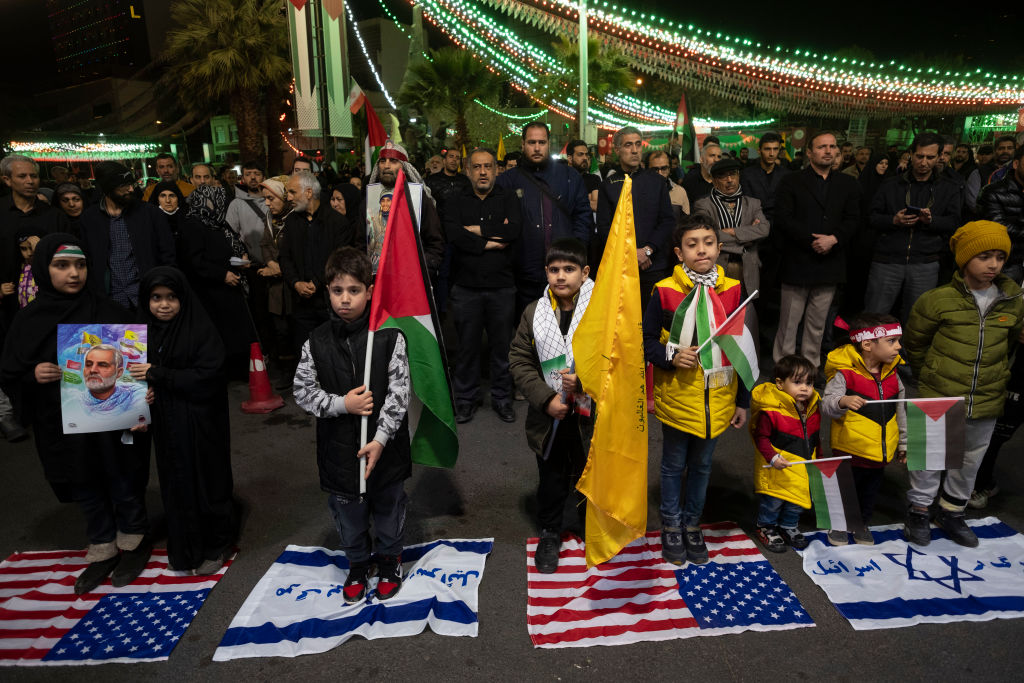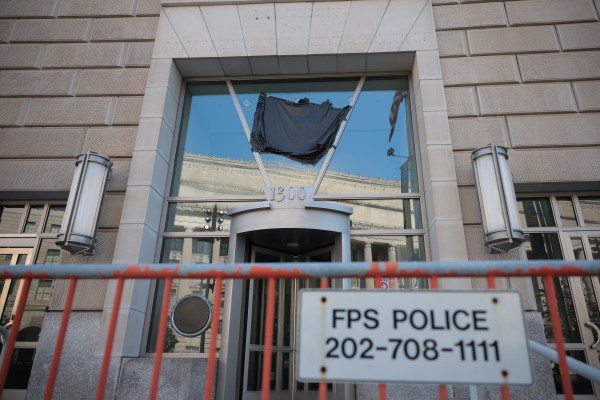Happy Wednesday! We all have to take out the trash—even astronauts on the International Space Station. Rarely, though, is that trash potentially three-year-old compacted batteries that fall from orbit and crash through two stories of a Florida man’s house.
Quick Hits: Today’s Top Stories
- Israeli Prime Minister Benjamin Netanyahu said Tuesday that Israel was responsible for the deaths of six international World Central Kitchen aid workers—among them a dual U.S.-Canadian citizen—and their Palestinian driver in Gaza on Monday. Netanyahu called the airstrike, which fired on the workers as they traveled in a three-car convoy in a “deconflicted zone,” a “tragic case of our forces unintentionally harming innocent people in the Gaza Strip.” Israel has promised an independent investigation into what its preliminary probe found to be a “misidentification” in complex, wartime conditions. In a strongly worded statement Tuesday, U.S. President Joe Biden said he was “outraged and heartbroken” to hear of the aid workers’ deaths, adding, “Israel has not done enough to protect aid workers trying to deliver desperately needed help to civilians.” Central World Kitchen said Tuesday it was suspending its operations in Gaza.
- A 7.4-magnitude earthquake struck the east coast of Taiwan early Wednesday morning local time, the strongest tremor to hit the island in 25 years. At least 26 buildings in Taiwan have collapsed, according to the island’s Central Emergency Command Center, leaving many people trapped underneath. At least nine people have reportedly died as a result of the quake—which triggered tsunami warnings in Japan—and hundreds more are injured. Nearly 100,000 people are without power in Taiwan.
- President Biden spoke on the phone to Chinese President Xi Jinping on Tuesday, the first time the two had spoken since they met in California in November. National Security Council spokesman John Kirby said the conversation was “candid and constructive,” and the White House summary of the call—which comes ahead of visits to China by two U.S. Cabinet officials in the coming weeks—indicated the two discussed how to combat fentanyl production, the risks of artificial intelligence, and climate change. The White House said Biden also raised U.S. concerns about China’s support for Russia’s war in Ukraine and Beijing’s “unfair trade policies.” Xi, for his part, called Taiwan the “first red line” in the relationship between the two countries.
- Ukrainian President Volodymyr Zelensky signed a law on Tuesday lowering the wartime draft age from 27 to 25, potentially expanding the number of men available to fight in the ongoing war against Russia. Though the law—first passed by the parliament in May of last year—lowered the age at which men can be drafted, they still cannot be mobilized into combat until 27. Meanwhile, likely Ukrainian drones on Tuesday struck an oil refinery and drone factory to the east of Moscow, 700 miles from Ukrainian-controlled territory. Though officials in Kyiv have not formally claimed responsibility for the attack, it would mark the deepest Ukrainian attack into Russia so far.
- Democratic Wisconsin Gov. Tony Evers on Tuesday vetoed a bill that would have barred transgender high schoolers from competing on girls’ teams and required schools to create three categories of teams—male, female, and coed teams. The bill’s Republican supporters do not have sufficient votes to override Evers’ veto.
The Proxy War Heats Up

On Monday afternoon local time, a rare daytime airstrike leveled a building directly next to the Iranian embassy in Damascus, Syria, killing three high-ranking Iranian Islamic Revolutionary Guard Corps (IRGC) commanders and four other IRGC officers, according to Iranian officials.
The strike—which the U.S. attributed to Israel—marks the latest chapter in Israel and Iran’s escalating shadow war, as the Israel Defense Forces (IDF) continue to directly target IRGC personnel who are aiding and abetting attacks on Israeli soil.
As local authorities picked through the flattened building—the wreckage of which had knocked the pole bearing the Islamic Republic’s flag to a precarious 45-degree angle—Syrian officials claimed four Syrians were killed in addition to the seven Iranians. A member of Hezbollah, an Iranian-backed, Lebanon-based terrorist group, was also killed in the strike, and 13 other people were reportedly wounded.
Though it’s Israeli policy not to formally comment on such strikes, U.S. officials said Tuesday they assessed that the IDF was behind the attack, and four unnamed Israeli intelligence officials told the New York Times likewise—that Jerusalem was responsible. The Iranian and Syrian governments were quick to condemn Israel for the strike and threaten repercussions, as a matter of course. “This unfair crime won’t go unanswered,” Iranian President Ebrahim Rais said yesterday.
Some top United Nations (UN) officials condemned the attack—which targeted what Iran said was a consular building—as violating international law’s protections for diplomatic facilities. “The secretary-general reaffirms that the principle of the inviolability of diplomatic and consular premises and personnel must be respected in all cases in accordance with international law,” a spokesperson for UN Secretary-General Antonio Guterres said Tuesday. But Rear Adm. Daniel Hagari, an IDF spokesman, claimed Monday—without confirming Israel’s involvement—that the IDF’s intelligence showed the strike did not target a consulate or embassy but rather “a military building of Quds forces disguised as a civilian building.” Officials in Iran have indicated it considers this attack one on its sovereign territory.
“If you’re having a bunch of top IRGC generals meeting, you’ve made it a military facility, not a diplomatic facility,” said Gabriel Noronha, a senior fellow at the Jewish Institute for National Security of America who previously worked on Iran policy at the State Department.
Indeed, among the dead from Monday’s strike was Gen. Mohammad Reza Zahedi, the U.S.-sanctioned Quds Force commander in charge of operations in Syria and Lebanon. There, he led Iran’s engagement with and arming of Hezbollah: The well-armed militia has spent the months since Hamas’ October 7 massacre in Israel launching cross-border attacks that have displaced tens of thousands of Israelis living in the northern part of the country, as The Dispatch’s Charlotte Lawson has reported from the evacuated zones. But the strike cut a level deeper into the Quds Force bureaucracy: Zahedi’s deputy, Brig. Gen. Mohammad Haj Rahimi was also killed. Hezbollah said Tuesday Zahedi had helped the group “develop and advance” their activities.
In a piece on the site today, Jason Brodsky, the policy director of United Against Nuclear Iran, explained the significance of Zahedi’s death for the IRGC and its work with Hezbollah:
Zahedi in his capacity as commander of Department 2000 of the Quds Force oversaw its Unit 2250, which is responsible for logistics, especially arms transfers and supporting Hezbollah, as IntelliTimes has reported. The late Razi Mousavi, the head of Unit 2250 before he was assassinated late last year, thus reported to Zahedi. Both men had longstanding relationships, networks, and experience, so their deaths are a blow to the IRGC. But they are not insurmountable: The fundamentals of the IRGC’s doctrine and strategy will remain the same.
Nevertheless, with the late IRGC Quds Force Commander Qassem Suleimani, Hejazi, Zahedi, and his deputy Mohammad-Hadi Haji-Rahimi removed from the battlefield, this may accelerate the ongoing trend of diffusion and decentralization of IRGC regional operations under Esmail Ghaani’s Quds Force commandership, with Hezbollah and other actors playing an increasingly active role in its supervision to compensate. A replacement for Zahedi will eventually be found, but the killing of his deputy, who previously served as the Quds Force deputy coordinator, its third-most senior position, further hollows out the Quds Force and Department 2000’s top brass. Zahedi likely played an integral role in the IRGC’s joint operations rooms with members of its Axis of Resistance and his loss will be felt there at the coordination level.
Iran has been content to attack Israeli and American targets in the region via its proxies—like Hamas in Gaza, Hezbollah in Lebanon, the Houthis in Yemen, and an array of militias in Iraq and Syria, all forming part of what it calls its “Axis of Resistance.” Tehran encourages, funds, and arms these groups while allowing them to absorb blame and the costs of reprisals. The near-daily attacks from Hezbollah against northern Israel and the Houthis’ assaults on international shipping are examples of Iran’s so-called axis in action. Though Iranian Supreme Leader Ayatollah Ali Khamenei vowed that his regime “will make [Israel] regretful about the crime and similar acts,” such rhetoric is typical for Tehran, and it remains to be seen what an Iranian response will look like. Iran, Noronha said, “has the desire to escalate as much as it can without getting the blowback and the responsibility for its own actions.”
The U.S. and Israel have engaged with the proxies themselves. Iranian-backed militant groups have attacked U.S. military installations in Iraq and Syria more than 150 times since October, using the pretext of American support for Israel to justify its strikes. Those attacks have resulted in numerous injuries, but also the death of three U.S. service members in January. The attacks abated for almost two months following a series of retaliatory strikes by the U.S. military in early February, but that lull reportedly ended Monday after an unsuccessful drone attack on a U.S. installation in Syria. Israel has also been engaging with Hezbollah in addition to its war with Hamas, just Sunday announcing its forces had killed a Hezbollah commander in a separate airstrike in Lebanon.
But Israel in recent months has also been more regularly striking targets upstream of the proxies, including the IRGC and key intermediaries for Iran-backed groups. Since December, Iran has confirmed that 18 IRGC personnel and senior leaders have been killed in suspected Israeli strikes. “They’ve been targeting members of the IRGC and Hezbollah in Syria at a much greater rate than they have in previous years, especially [compared to] pre-October 7,” Joe Truzman, a senior research analyst at the Foundation for Defense of Democracies, told TMD. But Truzman also said Monday’s strike was “definitely different from previous Israeli operations in Syria.”
“This is a much bigger thing,” he added.
Some analysts see the strikes as part of an Israeli strategy to raise the costs of continued Iranian attacks via proxies. In October, “Hamas did the dirty work [and] Hamas is getting pummeled for it,” Noronha told TMD. “But Iran has largely escaped unscathed for everything that has happened in the last six months.”
Monday’s strike could be a sign that Iran’s repercussions-free strategy may have run its course. “Israel is starting to expand the envelope and say, ‘We’re going to hold the whole proxy network accountable, and we’re going to hold Iran accountable for the actions of its proxies,’” Noronha said. The deaths of Zahedi et al. also send a message to Tehran that, if a full-scale war with Hezbollah breaks out, the repercussions will be felt well beyond the frontline in southern Lebanon.
But the Biden administration worries the Damascus strike will heat things up in the Middle East, rather than deter conflict. “Of course, we are always concerned about anything that would be escalatory or cause an increase in conflict in the region,” State Department spokesman Matthew Miller said on Monday when asked about the strike. “It has been one of the goals of this administration since October 7 to keep the conflict from spreading.”
The Biden administration reportedly conveyed to Iran within hours of Monday’s strike that the U.S. “had no involvement” in what took place, and Pentagon officials have since said so publicly. “Let me make it clear. We had nothing to do with the strike in Damascus,” White House national security spokesman John Kirby told reporters yesterday. “We weren’t involved in any way.”
The statements could be read as an attempt to prevent the U.S. from once again becoming the target of retaliatory action by Iran and its proxies. Despite American efforts to put space between Washington and Jerusalem, however, Iranian Foreign Minister Hossein Amir-Abdollahian said in a statement Monday that the U.S. “must be held accountable” as a “supporter of the Zionist regime.”
When the Biden administration responded to attacks on U.S. forces by Iranian-backed militias earlier this year, it targeted the proxies and facilities used by the IRGC, but avoided striking senior IRGC personnel directly. That kind of calculation may not be part of Israel’s game plan. “[The U.S.] didn’t really go after the IRGC. They didn’t go after Iran itself,” Truzman told TMD. “Israel is, in this case.”
Worth Your Time
- For Rest of World, Darren Loucaides reported on how facial recognition software is changing the nature of protests and strengthening authoritarians. “In countries where demonstrating can come with physical or political risk, large-scale protests have historically offered a degree of anonymity, and, with it, a level of protection,” Loucaides wrote. “But in the last decade, the spread of facial recognition technology has changed that equation: A lone face in a crowd is no longer anonymous; facial recognition allows authorities to capture people’s identities en masse. … Rest Of World spoke to five Russians who had attended protests in the past and were later tracked down by law enforcement using facial recognition technology. … The full potential of facial recognition technology as a tool against protest became clear in April 2021 at a march in support of Navalny. … Few people were detained at the protest, but OVD-Info’s lawyers soon realized that facial recognition had been deployed at the event when police started showing up at the homes and workplaces of many attendees.”
- What happened to Boeing? “Its stock price has fallen by nearly a third this year,” Jeff Wise reported for Intelligencer. “The booking site Kayak says that customers’ use of a tool to deselect 737 Max flights has risen 15-fold since the January blowout. Regulators and prosecutors are digging into the company’s inner workings. And across the aviation industry, the sense of crisis has grown so profound that even after last month’s purge of top Boeing leadership, a sense of unease remains. … To unlock the value still inherent in its planes and its people, Boeing has to stop undermining itself. It needs to shed an ideology that worships short-term profit and relearn a devotion to long-term value. … ‘What gives Boeing a shot at redemption is that they don’t face a lot of competition, which gives them some breathing room to improve,’ says David Primo, a professor of business administration at the University of Rochester. Indeed, for all its troubles, the 737 Max order book is sold out for years to come. But that shouldn’t be grounds for complacency. ‘If at some point consumers lose faith in them to the point where airline bookings decline markedly,’ Primo says, ‘then they are toast.’”
Presented Without Comment
Axios: Jon Stewart Claims Apple Wouldn’t Let Him Interview FTC Chair [Lina Khan] on His Podcast
Also Presented Without Comment
NBC News: House GOP Lawmakers Introduce Bill to Rename Dulles Airport After Donald Trump
Also Also Presented Without Comment
Associated Press: New York Inmates Are Suing to Watch the Solar Eclipse After State Orders Prisons Locked Down
The suit filed Friday in federal court in upstate New York argues that the April 8 lockdown violates inmates’ constitutional rights to practice their faiths by preventing them from taking part in a religiously significant event.
Toeing the Company Line
- What is Havana Syndrome, and is a foreign adversary behind it? Why is Michigan so important in 2024? And how will Florida’s dueling abortion rulings play out come November? Mary was joined by Insider editor Michael Weiss, Drucker, John, and Charles to discuss all that and more on last night’s Dispatch Live (🔒). Members who missed the conversation can catch a rerun—either video or audio-only—by clicking here.
- In the newsletters: Nick wondered why (🔒) the Biden campaign hasn’t done much outreach to Nikki Haley voters and other disaffected Republicans.
- On the podcasts: In a break from rank punditry, Sadanand Dhume joins Jonah on The Remnant to discuss India.
- On the site: Jonah argues that RFK Jr.’s candidacy is a case of “be careful what you wish for,” and Jason M. Brodsky explains the significance of Mohammad Reza Zahedi’s apparent assassination.
Let Us Know
Should Israel—and the U.S.—target IRGC leaders directly? Should they still do so, even if it risks escalation in the Middle East?







Please note that we at The Dispatch hold ourselves, our work, and our commenters to a higher standard than other places on the internet. We welcome comments that foster genuine debate or discussion—including comments critical of us or our work—but responses that include ad hominem attacks on fellow Dispatch members or are intended to stoke fear and anger may be moderated.
With your membership, you only have the ability to comment on The Morning Dispatch articles. Consider upgrading to join the conversation everywhere.